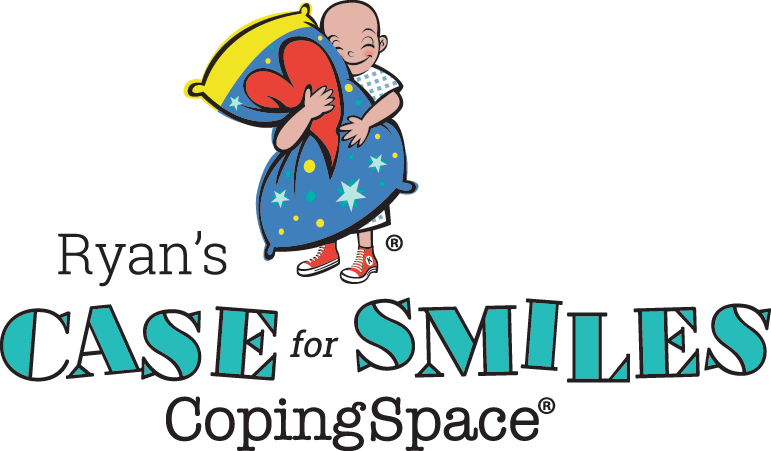COPING TIPS FOR SIBLINGS
Having a brother or sister receive medical treatment can be confusing and scary for a sibling. They may not understand what is going on or their reactions. Fortunately there are ways parents can help them cope.
Having a brother or sister receive medical treatment can be confusing and scary for a sibling. They may not understand what is going on or their reactions. Fortunately there are ways parents can help them cope.
 Friends, family and parents all play an important role in helping siblings cope. As much as possible, it is important to help them maintain their regular lives – going to school, playing sports, seeing friends. However, it is also necessary to acknowledge that things have changed and recognize their unique situation.
Friends, family and parents all play an important role in helping siblings cope. As much as possible, it is important to help them maintain their regular lives – going to school, playing sports, seeing friends. However, it is also necessary to acknowledge that things have changed and recognize their unique situation.
- Children have active imaginations and they can get the wrong idea about what is happening. Ask questions to figure out what your child knows and try to answer simply and honestly, in age-appropriate ways.
- If possible, allow your well child(ren) to be a part of their sibling’s care. Plan a visit to the hospital and introduce them to the healthcare team. Let them choose which toys and games to take to the hospital. This will take away some of the mystery and allow them to feel they are helping and have some control.
- Acknowledge their emotions and the changes in their routine. When possible try to accommodate their need for normalcy and include them in decision making about necessary adjustments. For more information on this, and other ways to help, check out our Guide to Helping Kids With Change.
- Think of ways that you can spend time together as a family, if possible. It is important to take time to spend with the sibling, despite the pressing nature of treatment. Even a half hour of special time alone with you can go a long way.
- Ask the hospital staff about programs for siblings. Hospitals may offer sibling support through their social work, child life, or chaplain services.
- Encourage your child to create/maintain their own identity outside their brother/sister’s illness or injury and recognize the other areas of their lives. They will still be facing all the same challenges and opportunities as other kids but may feel they are not as important or acknowledged by others in their lives.
 Friends, family and parents all play an important role in helping siblings cope. As much as possible, it is important to help them maintain their regular lives – going to school, playing sports, seeing friends. However, it is also necessary to acknowledge that things have changed and recognize their unique situation.
Friends, family and parents all play an important role in helping siblings cope. As much as possible, it is important to help them maintain their regular lives – going to school, playing sports, seeing friends. However, it is also necessary to acknowledge that things have changed and recognize their unique situation.
- Children have active imaginations and they can get the wrong idea about what is happening. Ask questions to figure out what your child knows and try to answer simply and honestly, in age-appropriate ways.
- If possible, allow your well child(ren) to be a part of their sibling’s care. Plan a visit to the hospital and introduce them to the healthcare team. Let them choose which toys and games to take to the hospital. This will take away some of the mystery and allow them to feel they are helping and have some control.
- Acknowledge their emotions and the changes in their routine. When possible try to accommodate their need for normalcy and include them in decision making about necessary adjustments. For more information on this, and other ways to help, check out our Guide to Helping Kids With Change.
- Think of ways that you can spend time together as a family, if possible. It is important to take time to spend with the sibling, despite the pressing nature of treatment. Even a half hour of special time alone with you can go a long way.
- Ask the hospital staff about programs for siblings. Hospitals may offer sibling support through their social work, child life, or chaplain services.
- Encourage your child to create/maintain their own identity outside their brother/sister’s illness or injury and recognize the other areas of their lives. They will still be facing all the same challenges and opportunities as other kids but may feel they are not as important or acknowledged by others in their lives.
Ways to Help Siblings Cope
- As much as possible, maintain everyday routines, activities, limits. This can help things feel more normal at home. Having regular routines and activities (like meal times, bed times, and chores) give children things to expect and look forward to. Even though it can be tempting to relax family rules to help siblings feel special or make up for hard times, it’s often better to keep most of the rules and expectations the same.
- Set aside time regularly to talk with your other children about what is happening, what to expect, and what they are feeling. Let them ask lots of questions. If you are nervous about having these difficult conversations, read How to Share Bad News with Your Child for additional support.
- Answer your child’s questions in honest, simple terms. You may have to break up the talk into mini talks or discuss things more than one time.
- Encourage your children to share their feelings and recognize that they will likely change day by day. There are many ways to share feelings (talking, drawing, story-telling, hugging) at different times (dinnertime, bedtime) and places (in the car, at home, in the hospital). Help siblings name their feelings such as being sad, scared, angry, jealous, or guilty. Share your own feelings and be a good listener, even if what they have to say is hard to hear.
- Notice when siblings are feeling sad, worried or lost in their thoughts – or when they seem angry or irritated. Ask what’s on their mind. Remember that changes in behavior can come from worries or upset feelings.
- Allow choices whenever possible. They might choose what to eat, or if and when to visit their brother/sister in the hospital.

- Encourage siblings to have fun. Oftentimes, siblings feel guilty about wanting to have fun while their brother or sister is not well. Remind them it’s good to spend time with friends and do activities or hobbies they enjoy. Even better, demonstrate this behavior yourself.
- Children hear more than one would think. Be mindful of what conversations take place in front of or near them. Let them know that you are there to answer any questions that they may have.
- Reassure your child that they did not cause the illness and (if this is not an infectious illness) they cannot “catch” it. “Cancer [or diabetes] is not like having a cold, you cannot get sick by being around your brother or giving him kisses.”
- Use technology to keep in touch while at the hospital (call, video chat).
- If their sibling with an illness or injury now looks or acts very different from before, your child may feel embarrassed or not know what to say. Speak with them about what they are feeling and rehearse some phrases that they could use when someone asks a question or comments about their brother or sister.
- Does your child have a special comfort item? If so, try to make sure it goes everywhere they go.
- Encourage friends/family to treat your child as an individual person, separate from their sibling. It may also be helpful to speak with their friends or friends parents about how they can be most supportive.
- Seek help if your other children seem to be struggling. Talk to your child’s doctor about seeking help from a mental health professional, such as a psychologist or social worker.
- Get additional tips from real siblings who’ve been there by reading, How to Help Siblings of Children with Cancer and Other Serious Illnesses.
Useful Phrases to Use with Siblings
It is important to talk openly with your children about the changes in all of your lives and what they are experiencing. You know them best, and you probably have experiences which you can draw on now. The doctors and nurses may also have specific suggestions for how to explain a sibling’s illness or treatment in child-friendly language.
Here are some suggestions to get you started.
- “How are you doing? Is there anything that you are worried or scared about? When I am worried, I think it is helpful to talk to someone.”
- “This is a very confusing time for all of us. Is there anything that you want to talk about?”
- “If you feel like you don’t want to talk right now, how about drawing or writing about what’s happening and how YOU are feeling?”
- “A lot is going on and has changed. I bet sometimes it feels like everything is out of control. How are you doing? Is there anything we can do to help?”
- “I know I have been spending a lot of time with your brother/sister at the hospital. I wouldn’t be surprised if sometimes you might even feel jealous.”
- “The hospital/clinic is a new place for all of us. If there is something that you aren’t sure about or that scares you, please let me (us) know so we can talk about it.”
- “Sometimes, to best help your brother/sister, the nurses or doctors have to check out their body, or give them medicines that can only be given at the hospital/clinic.”
- “You may be feeling mad or sad that _______ and I (mom, dad) have to be away so much and stay at the hospital. Can we talk about how you feel and what things we can do to make it a little easier?”
- “I know _______ has been getting a lot of gifts and attention since he/she got sick (hurt). I know sometimes that might not seem fair.”
- “Is there anything you need? What would make things easier for you?”
Note: Find out from the child life specialists, nurses and doctors what to expect, and choose your words accordingly. It is important not to make promises (e.g. it will only be a small pinch) that are not realistic.
Resources for Siblings
While caregivers will always be the primary source of support for siblings, you cannot do it all alone. Fortunately, there are resources out there to help siblings navigate this difficult time. Below are some ideas to get you started. For additional information and ideas, check out our blog post, Resources for Siblings Who Have a Brother or Sister with an Illness and Injury and download the Sibling Resource List.
- Child Life Specialists and Hospital Programs – In addition to the child with an illness or injury, Child Life Specialists (CLS) can be a great resource for siblings. They might help explain a child’s diagnosis and treatment plan, teach coping skills, or recommend other sibling-specific programming.
- School Support – Teachers, guidance counselors and other school staff can play an important role in how well children over the age of five adjust and cope. They may watch for behavior changes and signs of stress, provide appropriate accommodations, and act as a safe place to share feelings. Guidance counselors and school psychologists may also suggest outside resources such as therapists, support groups and tutors should the need arise. Another helpful tool is the sibling school form to communicate with your child’s the school. Print your form off here.
- JustSibs – For siblings between the ages of 11-16, we offer JustSibs.org, an interactive, digital experience to help them navigate and cope with the many challenges and emotions they face. Here they will find a variety of resources, including the choose-your-own adventure style comic, SibXperience, to assist them on their journey from their sibling’s diagnosis through treatment, and beyond.
- Camps for Siblings – Camps can be a great opportunity for siblings to have fun, connect with kids who understand, and receive support and guidance from counselors who are trained to address their special circumstances. However, many are diagnosis specific, so it’s best to talk to your child life specialist or social worker for referrals.
- SibShops – Sibshops are in-person, pedal-to-the-metal events where children can meet other siblings who are ‘in their shoes’, have fun, play games, laugh, and talk about what it is like having a sibling with medical needs. They are designed to help siblings develop healthy coping strategies and feel less alone. To find one near you, search the SibShop Directory.
Arranging Community Support for Siblings
Friends and family can play a very important role in your well children’s lives. There may be times when you have to focus on your one child’s needs and require extra help. Ask family, friends, and possibly the school to give your other children some special attention and lend a hand. It may be useful to share the Community page for specific tips and suggestions on how to help.
Here are a few ideas to get started.
- Your child may start to feel that their new identity is ______’s sister instead of who they really are. Speak with your child’s teacher, as well as the hospital staff. Ask them to refer to your children by their names and also recognize all the great things they have done.
- Many times people will bring gifts for the child who is receiving care. While some people may also bring gifts for the sibling, that is not always the case. Think about how you and your family might handle this situation. Some families share the items with all of their children, while others set certain things aside for the siblings. Try asking close family and friends to think of all the children when bringing items to the hospital or home.
- You can’t be two places at once and sometimes you need others to watch, drive or otherwise care for well child. This change can be hard, but maintaining routines can help. To make the transition easier, use the About Me Sibling Form to share your child’s routines, likes/dislikes and more.
- If your child attends school or daycare, talk to them about keeping your child on their usual routine as much as possible, to keep some sense of “normal” in their day. The School Sibling Support Form can help with these conversations. School personnel may also take our free webinar, “Supporting Students Whose Sibling has a Life-Changing Illness or Injury”, to learn more.
- Friends play a big role in the coping process, although siblings may feel like they want to ask a lot of questions. Try to encourage them to do the things that they did prior to the illness or injury and talk about “normal” things.
- Talk to your children’s friends and have them say “I have a question about your brother/sister, can we talk about it?” This gives your child the choice to respectfully decline speaking about their sibling.
Helping Your Child Talk About Their Sibling
Siblings are often asked questions about their brother/sister’s treatment and health by friends, family and strangers. This can be uncomfortable as often they do not know what to say.
First, assure them they do not have to answer any questions they do not want to. Then help them prepare for common situations they may face. Below are a few suggestions. You can also find more tips and ideas for answering questions about their brother/sister’s illness or injury here.
Answering the Question, “What Happened to Your Brother/Sister?”
- If your child wants to answer the question they could use a simple answer like, “My brother has cancer. He is at the hospital getting his medicine. Thank you for asking about him and how he is doing.”
- If they do not want to answer, they can say, “I don’t really want to talk about it right now.”
When People Only Want to Talk About Their Sibling
- “I don’t really want to talk about my brother right now. Can we please play a game instead?”
- “It sounds like you have a lot of questions about my sister, can you please ask them to my parents?”
- “Can we please talk about something other than my brother/sister?”
When People Say Inaccurate Things
- “I think you should talk to my parents about that because that is not what I have heard.”
- This is a good time to remind your child that you are there whenever they want to talk.
When People Say Mean Things
(Name Calling, Making Fun of Them or Their Sibling, or Being Rude)
- Help your child rehearse things to say INTERNALLY, to him or herself, to help them stay calm.
- Your child could walk away and not address the insult
- If it is appropriate or necessary to say something, help your child figure out what works for them. Trading insults or being mean back is not likely to be helpful:
▪ “I don’t like it when you say that about my brother/sister. You wouldn’t like it if people made fun of you.”
▪ “Saying those things is mean.”
Remember:
Teach your child to leave the situation if they are very uncomfortable or feel they are in danger and tell someone immediately.
